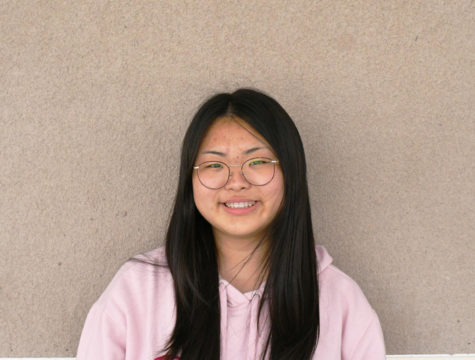Anand, Klubeck grapple with hearing loss during COVID-19
September 17, 2021
Aditi Anand’s (12) biggest pet peeve is the word “nevermind.”
It’s a word she has heard far too often in conversations with classmates and friends, a word that usually comes after she asks multiple times for someone to repeat what they said.
“[The word ‘nevermind’] makes me feel unheard and not acknowledged,” Anand said. “It makes me feel less worthy [for having to ask for things to be repeated].”
Anand has severe sensorineural hearing loss and relies on hearing aids to hear everything from her teachers giving instructions to conversations with her peers. As a child, her mother noticed that Anand wasn’t communicating with her properly and took her to the doctor to have her hearing checked. After the visit, the results came back: 25% deaf.
“When I started to wear hearing aids [in kindergarten], I hated them,” Anand said. “As a child, I noticed that I had something different from other children and that made me feel [excluded].”
Sometimes, this mistreatment came not just from her peers, but from teachers as well.
“A lot of my teachers didn’t think I was very capable in my elementary school years,” Anand recalled. “I’ve dealt with teachers and students that were really unfair to me and wouldn’t accommodate my needs.”
On the other end of the spectrum, Anand has also encountered wonderful teachers that have created an inclusive space for her. In particular, her first grade teacher went out of her way to make her feel special.
“In first grade, my family was going to move to India for a year or two and I felt really sad about leaving all my friends behind,” Anand recalls. “The day I left, my teacher gave me this book of letters that my classmates had written to me. I read them the entire way to India. I still have that book and a lot of those letters are from current Westview students that I haven’t talked to in a long time, which I think is so adorable.”
Like Anand, Abby Klubeck (9) got hearing aids in elementary school, after failing multiple hearing tests.
“At first, I was missing everything [during the test] because I thought it was funny,” Klubeck remembered with a laugh. “But when I had to retake the test and actually tried, I still did bad.”
Doctors found out she was 75% deaf in her right ear and 25% deaf in her left one. In the third grade, Klubeck started wearing hearing aids.
The transition was not without difficulty; she often experienced teasing from her peers.
“People will find out I have hearing loss and start mouthing words and asking if I can hear them,” Klubeck said. “Or they’ll start making random hand movements to mimic sign language and that bothers me so much.”
Similar to Klubeck, Anand experienced demeaning behavior from her peers for her hearing disability, particularly in classroom settings.
“In middle school, we used to have vocab tests and on the spelling section, my teacher would constantly be walking around the classroom despite the multiple times I told them I couldn’t hear,” Anand recalled.
The pandemic has only served to exacerbate the problems they face.
“I never realized how much I depended on lip reading,” Klubeck said. “Masks make everything sound muffled, and since I can’t rely on reading lips, I have to focus a lot more on body language. It can be stressful and confusing when a teacher calls on me to answer a question and I’m completely lost.”
Anand thinks of her hearing loss as a puzzle: sometimes when she doesn’t hear the entire question, she’ll use context clues to piece it together.
“For instance, sometimes I only hear my teacher saying, ‘Aditi, can you…’,” Anand said. “I would then look at the questions on the board and figure out which question was being asked.”
While every person with hearing loss is different, Anand and Klubeck say that they learn the best when they are seated at the front of the classroom and captions are turned on during any videos played in class.
“Any person with hearing loss should have priority seating preference,” Anand said. “If you put them in the back of the classroom or in the area where not a lot of talk happens, they tend to miss out.”
Despite all the challenges they face in educational settings, both Klubeck and Anand are able to find silver linings within their difficult situations.
“It’s always heartwarming when teachers are considerate and accommodate my needs,” Klubeck said. “There was this one period in seventh grade when my hearing aid broke. Luckily, I was able to sit in the front, the teacher would repeat stuff for me, and everybody else would help me.”
For Anand, the biggest advantage to having hearing aids is a better quality of sleep.
“I can have peaceful naps,” Anand laughed. “If my parents are yelling, I can just turn my hearing aids off.”
Furthermore, hearing loss has shaped her relationship with herself and with those around her.
“Hearing loss has taught me to be patient with myself and opened me to many opportunities to make beautiful connections with people I don’t think I would have had otherwise,” Anand said. “For instance, I’ve had the opportunity to talk with a couple of UCSD mentors about their [hearing loss] research and a lot of doctors about how hearing loss even happens.”
Even though Anand has now lost 75% of her hearing, it hasn’t prevented her from pursuing her passions and future aspirations.
“I want to research a cure for hearing loss,” Anand said. “I was born with perfect hearing but I woke up one day and my hearing started deteriorating and none of my doctors knew why. It has motivated me to want to be a part of that change in the future.”


